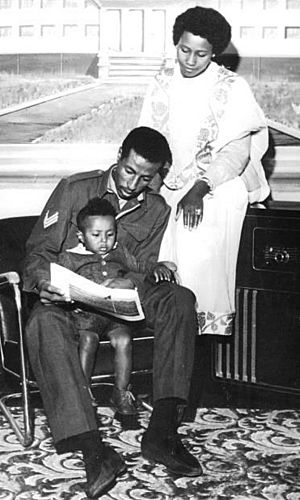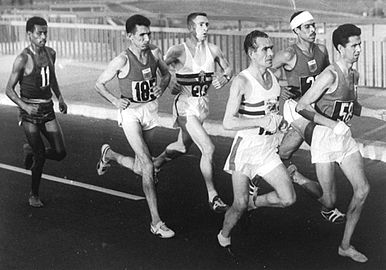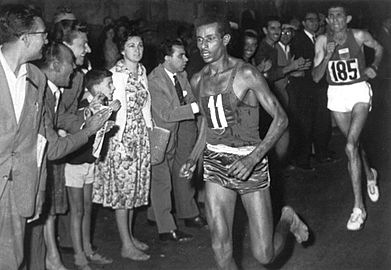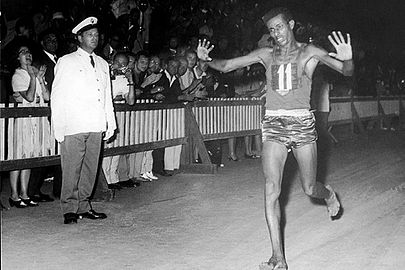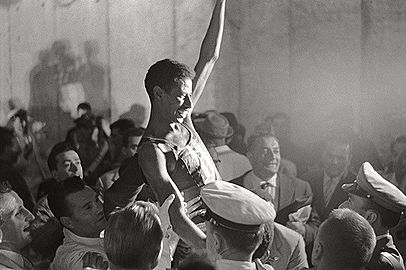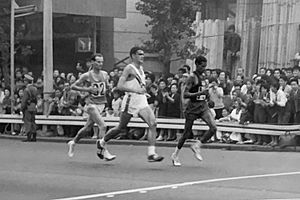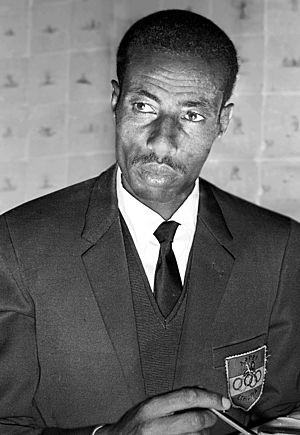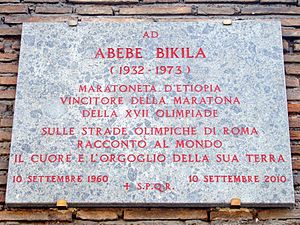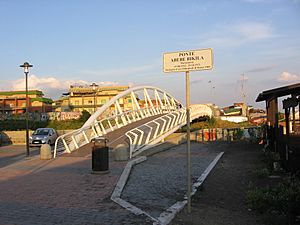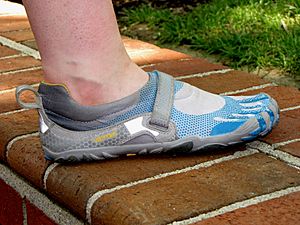Abebe Bikila facts for kids
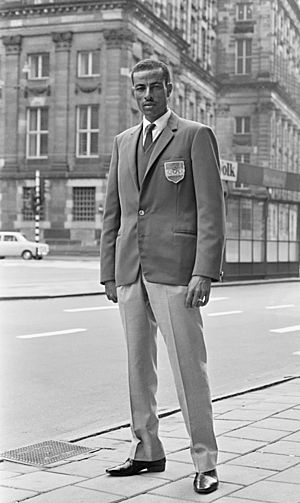
Abebe Bikila, 1968
|
||||||||||||||
| Personal information | ||||||||||||||
|---|---|---|---|---|---|---|---|---|---|---|---|---|---|---|
| Native name | ሻምበል አበበ ቢቂላ | |||||||||||||
| Born | August 7, 1932 Jato, Mendida, Ethiopian Empire |
|||||||||||||
| Died | October 25, 1973 (aged 41) Addis Ababa, Ethiopia |
|||||||||||||
| Resting place | Saint Joseph Church, Addis Ababa 8°58′11.57″N 38°46′1.51″E / 8.9698806°N 38.7670861°E |
|||||||||||||
| Height | 177 cm | |||||||||||||
| Weight | 57 kg | |||||||||||||
| Sport | ||||||||||||||
| Sport | Long-distance running | |||||||||||||
| Event(s) | Marathon, 10,000 m | |||||||||||||
| Achievements and titles | ||||||||||||||
| Personal best(s) |
|
|||||||||||||
|
Medal record
|
||||||||||||||
Abebe Bikila (born August 7, 1932 – died October 25, 1973) was an amazing long-distance runner from Ethiopia. He made history by winning two Olympic marathon gold medals in a row. He was the first person from Ethiopia and Africa to win an Olympic gold medal.
Abebe won his first gold medal at the 1960 Summer Olympics in Rome, Italy. What made his win even more special was that he ran the entire race barefoot! Four years later, at the 1964 Summer Olympics in Tokyo, Japan, he won his second gold medal. This made him the first athlete ever to win the Olympic marathon twice in a row. Both times, he set new world records.
Abebe was a soldier in the Ethiopian Imperial Guard, a special group that protected the emperor. He started as a soldier and became a captain. He ran in 16 marathons during his career. He came in second in his first marathon in Addis Ababa, won 12 other races, and finished fifth in the 1963 Boston Marathon. In 1967, he got a leg injury that stopped him from finishing his last two marathons. Abebe was a true pioneer in long-distance running. Many great runners from East Africa, like Haile Gebrselassie, have followed in his footsteps.
In 1969, Abebe was in a car accident that left him unable to walk. Even after this, he showed incredible spirit. He competed in sports for disabled people, like archery and table tennis. He even won a cross-country sleigh-riding event! Abebe passed away at age 41 in 1973 due to problems from his accident. He was given a state funeral, and the emperor declared a national day of mourning. Many places, including a stadium in Addis Ababa, are named after him. He is remembered as a true hero and an inspiration.
Contents
Biography
Early Life and Training
Abebe Bikila was born on August 7, 1932, in a small village called Jato in Ethiopia. Interestingly, his birthday was the same day as the 1932 Los Angeles Olympic marathon. As a young boy, Abebe played a traditional long-distance game called gena, which is like hockey.
Around 1952, he moved to Addis Ababa and joined the Imperial Guard. This was a special army group. In the mid-1950s, Abebe would run about 20 kilometers (12 miles) from the hills of Sululta to Addis Ababa and back every day. A Swedish coach named Onni Niskanen, who trained the Imperial Guard, noticed Abebe's talent. He started training Abebe for marathons. In 1956, Abebe came in second in an army championship race.
Abebe married Yewebdar Wolde-Giorgis in 1960. They were married for the rest of his life.
1960 Rome Olympics: Barefoot Victory
In July 1960, Abebe won his first marathon in Addis Ababa. A month later, he won another race there with a time that was faster than the Olympic record at the time. His coach decided to enter Abebe and another runner, Abebe Wakgira, into the marathon at the 1960 Summer Olympics in Rome.
When Abebe arrived in Rome, he bought new running shoes, but they didn't fit well and gave him blisters. So, he made a brave decision: he would run the marathon barefoot!
The race in Rome was held in the late afternoon because of the heat. It started at the Capitoline Hill and finished at night near the Arch of Constantine. Abebe stayed with the lead group for much of the race. Around the 25-kilometer (15-mile) mark, Abebe and Rhadi Ben Abdesselam from Morocco pulled ahead of everyone else.
With only 500 meters (about 1,640 feet) left, Abebe sprinted ahead of Ben Abdesselam. He ran along the Appian Way, which was lit by Italian soldiers holding torches. Abebe crossed the finish line in 2 hours, 15 minutes, and 16.2 seconds. This was a new world record! He was 25 seconds faster than Ben Abdesselam. After finishing, Abebe wasn't even tired. He started doing stretches and said he could have run another 10 to 15 kilometers (6 to 9 miles).
After Rome: A Hero's Welcome
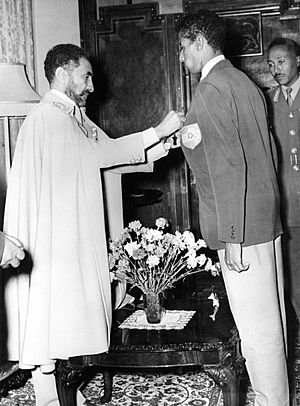
When Abebe returned to Ethiopia, he was a national hero! A huge crowd and important people greeted him. He was paraded through the streets of Addis Ababa, where thousands of people cheered for him. Emperor Haile Selassie gave him the Star of Ethiopia award and promoted him in the army. He was also given a car and a house.
In 1961, Abebe won the Athens Classical Marathon, again running barefoot. This was the last time he competed without shoes. That same year, he won marathons in Osaka, Japan, and Košice, Czechoslovakia.
In 1963, Abebe ran the Boston Marathon and finished fifth. This was the only time he completed an international marathon without winning. He and another Ethiopian runner, Mamo Wolde, had been running very fast, but cold winds and hills made them slow down.
1964 Tokyo Olympics: Another Gold
Just 40 days before the 1964 Summer Olympics in Tokyo, Abebe had an emergency appendectomy (surgery to remove his appendix). But he recovered quickly and left the hospital within a week!
For the Tokyo marathon on October 21, Abebe wore shoes this time. He started the race behind the leaders but slowly increased his speed. Around the 20-kilometer (12-mile) mark, Abebe took the lead and never looked back. By the 35-kilometer (21-mile) mark, he was almost two and a half minutes ahead of the next runner.
Abebe entered the Olympic stadium alone, to the cheers of 75,000 fans. He finished with an amazing time of 2 hours, 12 minutes, and 11.2 seconds. This was another world record and four minutes faster than the silver medalist! After the race, Abebe didn't look tired at all. He even did some stretches, like touching his toes and cycling his legs in the air.
He was the first runner to ever win two Olympic marathon gold medals in a row. Abebe, along with Waldemar Cierpinski and Eliud Kipchoge, are the only athletes to have achieved this. Once again, Abebe brought Ethiopia its only gold medal. The Emperor promoted him again and gave him another award, a car, and a house.
Later Years and Accident
Abebe continued to run marathons, winning races in Japan, Spain, and South Korea in 1965 and 1966. However, in July 1967, he injured his hamstring. This injury affected him for the rest of his running career. The 1966 Incheon–Seoul Marathon was the last marathon he ever finished.
In 1968, Abebe went to Germany for treatment for his leg problems. He returned in time to train with the Ethiopian Olympic team for the 1968 Summer Olympics in Mexico City. He hoped to win a third gold medal. However, a week before the race, he developed pain in his left leg. Doctors found a fracture in his fibula bone. Abebe had to drop out of the race after about 16 kilometers (10 miles). His teammate, Mamo Wolde, won the gold medal instead. This was Abebe's last marathon. After returning to Ethiopia, he was promoted to the rank of captain.
On March 22, 1969, Abebe was in a car accident. His car overturned, and he was trapped inside. The accident left him paralyzed from the neck down. He was taken to a hospital in England for eight months of treatment. Even though he couldn't walk again, he slowly regained movement in his arms.
Life After the Accident
In 1970, Abebe started training for wheelchair sports. He competed in archery and table tennis at the Stoke Mandeville Wheelchair Games in London. These games were an early version of the Paralympic Games. The next year, he competed in Norway and even won a cross-country sleigh-riding event!
Abebe was invited as a special guest to the 1972 Summer Olympics in Munich, Germany. He received a standing ovation during the opening ceremony. It was a powerful moment.
On October 25, 1973, Abebe passed away in Addis Ababa at age 41. He died from a brain hemorrhage, which was related to his car accident four years earlier. He was given a full military funeral, and about 65,000 people attended, including Emperor Haile Selassie. The emperor declared a day of mourning for this national hero. Abebe is buried in Saint Joseph Church in Addis Ababa.
Legacy
Abebe Bikila is seen as the person who started the success of East African runners in long-distance races. Many believe he began "the great African distance running avalanche." He also showed how important training at high altitudes is for athletes.
Five years after he passed away, the New York Road Runners started the annual Abebe Bikila Award. This award honors people who have made great contributions to long-distance running. Many famous East African runners have received this award.
Abebe is a national hero in Ethiopia. A stadium in Addis Ababa is named after him. In 2010, the Rome Marathon celebrated the 50th anniversary of his Olympic victory. The winner of that marathon, Siraj Gena, ran the last 300 meters (about 984 feet) barefoot to honor Abebe. A plaque in Rome and a bridge in Italy are also named after him.
In 2010, a shoe company called Vibram created a model of their minimalist shoes named "Bikila." In 2019, Abebe's family received his Olympic ring, which he had lost at the Tokyo Olympic stadium after his win. A woman who worked at the stadium had found it and kept it safe. Her son returned the ring to Abebe's son, Yetnayet, when he visited Japan.
Marathon performances
| Year | Competition | Venue | Position | Notes | ||
|---|---|---|---|---|---|---|
| Representing |
||||||
| 1956 | Armed Forces championship | Addis Ababa, Ethiopia | 2nd | |||
| 1960 | Armed Forces championship | Addis Ababa, Ethiopia | 1st | 2:39:50 | ||
| Olympic Trials | Addis Ababa, Ethiopia | 1st | 2:21:23 | |||
| Olympic Games | Rome, Italy | 1st | 2:15:16.2 | |||
| 1961 | Athens International Marathon | Athens, Greece | 1st | 2:23:44.6 | ||
| Mainichi Marathon | Osaka, Japan | 1st | 2:29:27 | |||
| Košice Marathon | Košice, Czechoslovakia | 1st | 2:20:12.0 | |||
| 1963 | Boston Marathon | Boston, US | 5th | 2:24:43a | ||
| 1964 | Armed Forces championship | Addis Ababa, Ethiopia | 1st | 2:23:14.8 | ||
| Olympic Trials | Addis Ababa, Ethiopia | 1st | 2:16:18.8 | |||
| Olympic Games | Tokyo, Japan | 1st | 2:12:11.2 | |||
| 1965 | Mainichi Marathon | Shiga Prefecture, Japan | 1st | 2:22:55.8 | ||
| 1966 | Zarautz International Marathon | Zarautz, Spain | 1st | 2:20:28.8 | ||
| Incheon–Seoul Marathon | Seoul, South Korea | 1st | 2:17:04a | |||
| 1967 | Zarautz International Marathon | Zarautz, Spain | DNF | |||
| 1968 | Olympic Games | Mexico City, Mexico | DNF | |||
See Also
 In Spanish: Abebe Bikila para niños
In Spanish: Abebe Bikila para niños
- Ethiopia at the Olympics
- List of athletes who have competed in the Paralympics and Olympics
- Marathon world record progression
- Sport in Ethiopia


